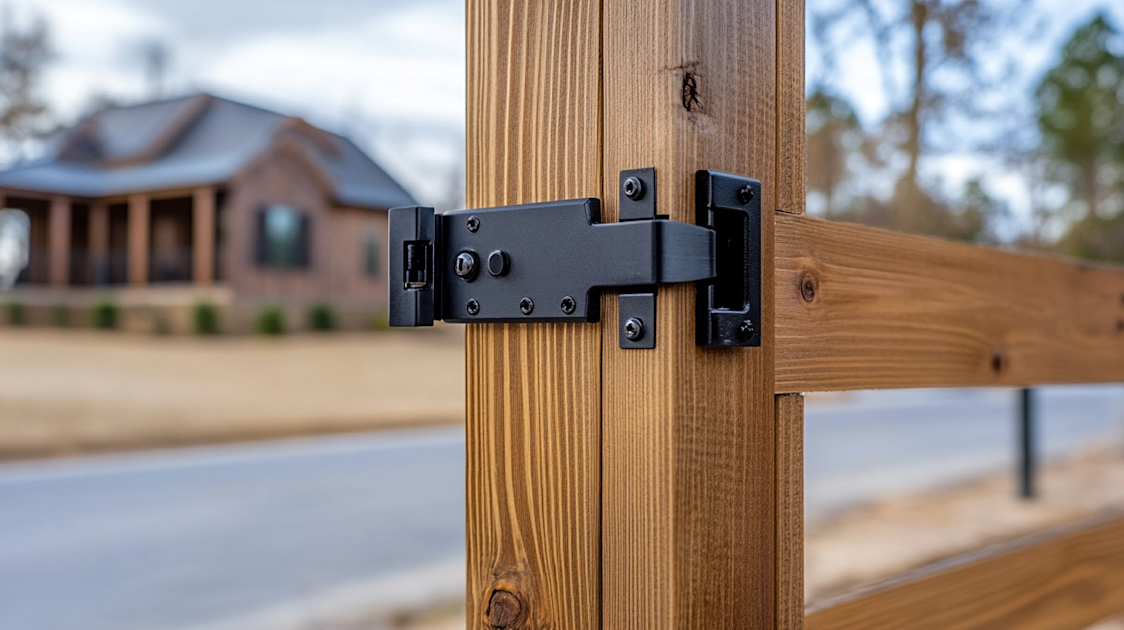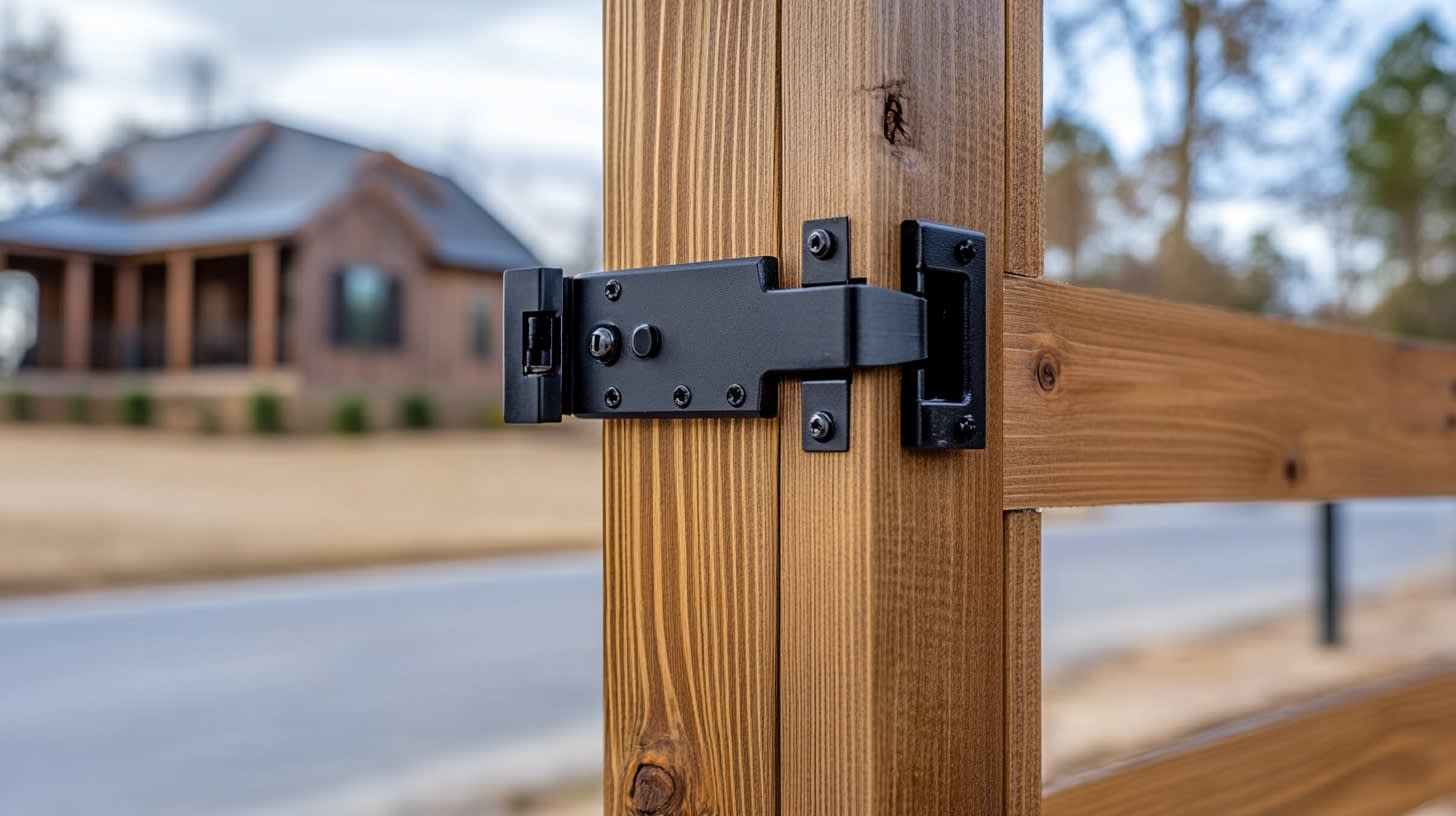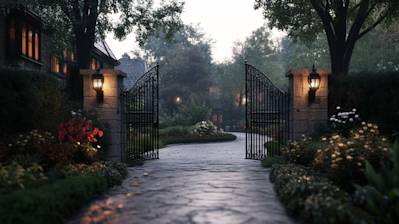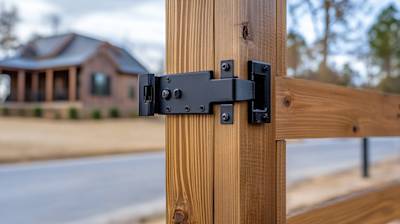Elevate the aesthetic and functionality of your home with the right kind of gate latch. A gate latch should not only be sturdy and durable, but also blend seamlessly into your existing decor. Dig deeper into the world of gate latches and discover how to choose the perfect one for your needs.
Understanding What a Gate Latch Is
A gate latch is a device that fastens a gate closed. It is typically comprised of a bar that falls into a catch or slot to prevent the gate from swinging open. Gate latches come in a wide variety of shapes, styles, materials, and mechanisms. Your latch selection determines how secure your gate will be and also how it complements the overall appeal of your outdoor space.
Types of Gate Latches
Gate latches are primarily divided into two categories based on the side of access.
-
Two-Way Gate Latches:
These allow access from both sides of the gate. They are ideal for places where you expect a lot of traffic or when you want the same level of access from either side. -
One-Way Gate Latches:
These only allow access from one side. They are perfect for areas where you want to limit access or enhance privacy.
Popular Styles of Gate Latches
There are several styles of gate latches available, here are a few to consider:
- Gravity Gate Latches
- Spring-Loaded Gate Latches
- Bolt Latches
- Twist Thumb Latches
- Lever Latches
- Ring Latches
Choosing the Right Material for Your Gate Latch
The durability and overall aesthetic of your gate latch will largely depend on its material. Here are a few common materials used in gate latch construction:
- Steel: Ideal for heavy-duty applications, steel gate latches are strong, durable, and resistant to rust with the right coatings.
- Stainless Steel: This material combines the strength of steel with superior resistance to the elements.
- Aluminum: This lightweight yet sturdy material is rustproof, making it great for coastal areas.
- Brass and Bronze: These materials are both strong and beautiful, adding an element of elegance to your gate.
Tips to Install Your New Gate Latch
Installation is an essential part of your gate latch experience. Here are some tips to make the installation process easier.
-
Know the Correct Height: The ideal height for a gate latch is around 48 inches from the ground. This ensures ease of access for adults while remaining out of the reach of children.
-
Use the Right Tools: Ensure you have all the tools required before you start installing the gate latch. Most gate latches will require a drill, screws, screwdriver, and possibly a metal file.
-
Ensure Proper Alignment: Always double-check your alignment before drilling any holes. The latch bar and catch must line up perfectly for the latch to work effectively.
Maintaining Your Gate Latch
Regular maintenance can extend the lifespan of your gate latch and keep it functionally optimally. Here's how:
-
Regular Cleaning: Dirt, grime, and rust can affect the functionality of your gate latch. Regular cleaning ensures these elements don’t compromise its performance.
-
Lubrication: All moving parts should be adequately lubricated to prevent wear and tear.
-
Inspections: Regular inspections can help you spot potential issues before they escalate.
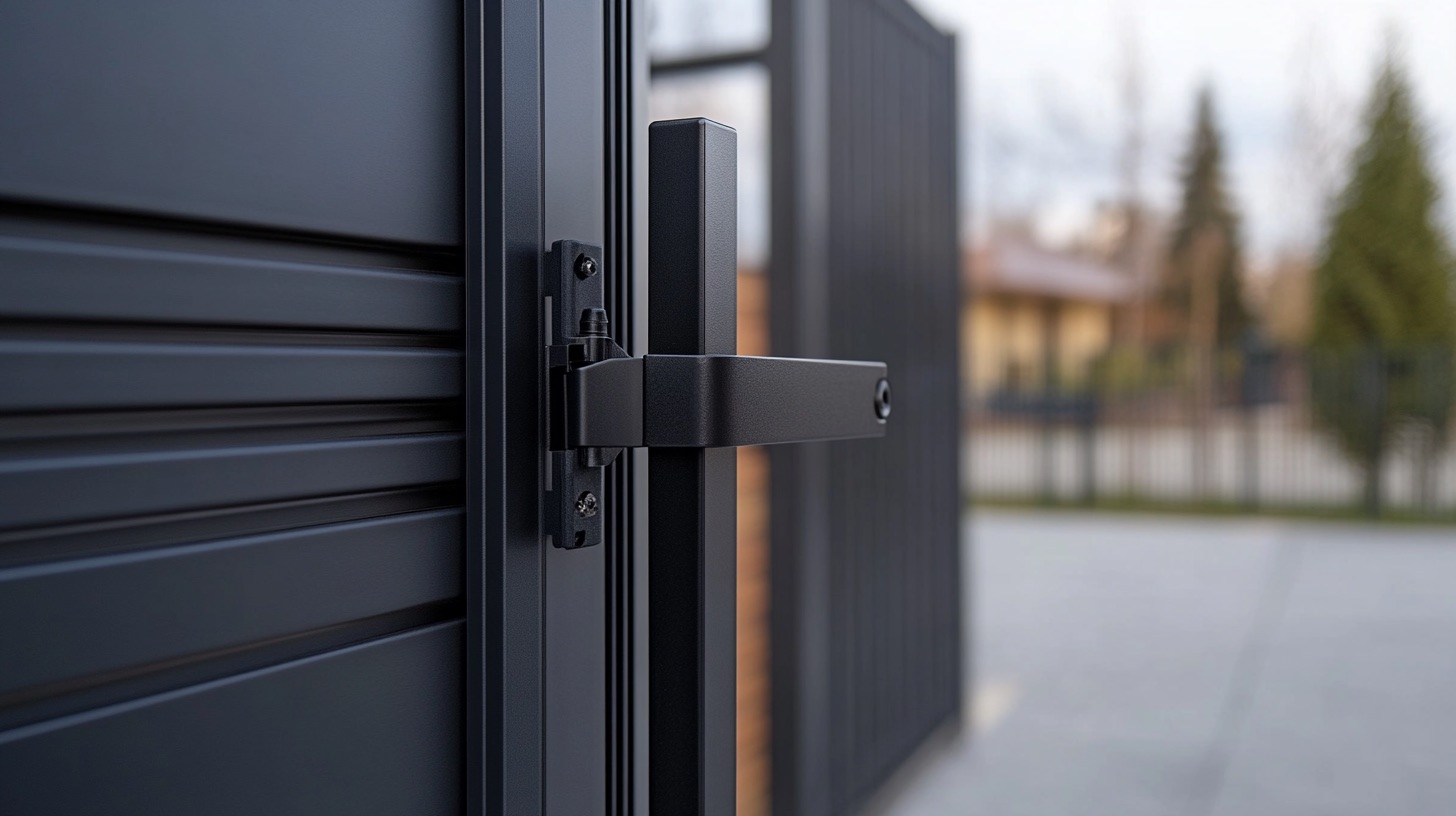
Frequently Asked Questions about Gate Latch
What different types of gate latches are available?
There's a delightful range to choose from when it comes to gate latches. The selection includes thumb latches, ring latches, lever latches, bolt latches, and magnetic latches. Each comes with its unique functionalities, making them suitable for different gate styles and functions.
Are gate latches easy to install?
Absolutely. The process typically involves drilling holes and fixing equipment with bolts or screws. However, the level of difficulty may vary depending on the type of latch and the sort of gate material involved. You might need basic DIY skills or you may require a professional for some complex latch systems.
How do I set up a gate latch?
Setting up a gate latch is relatively straightforward. You need to determine the type of gate latch you wish to install, then mark accurate points on your gate where you'll install the latch. After that, drill in some pilot holes, screw in your latch hardware, and finally, verify that it works properly.
Can gate latches be locked?
Absolutely yes. Several gate latch models come with built-in lock systems or the capability to affix external locks. This feature is quite handy in enhancing security and restricting access to certain areas.
Can a gate latch be opened from both sides?
You bet. Many gate latches, especially ring latches and lever latches, are designed to operate from both sides of the gate. It's a convenient feature when you need easy access from the inside or outside of your gate.
What materials are used to manufacture gate latches?
Gate latches are typically made from a variety of durable materials, including stainless steel, brass, iron, aluminum, and even plastic. The selection often depends on factors like environmental conditions, design aesthetic, or resistance to rust.
How long do gate latches last?
The longevity of a gate latch can depend on several factors, such as the material it is made of, the local weather conditions, and how often the latch is used. However, a good-quality gate latch can easily last several years with proper care.
Are gate latches expensive?
The cost of a gate latch can vary quite a bit, depending on the material, design, brand, and functionality. A standard latch can cost less than $10, while a high-end, designer or heavy-duty latch may go upto a few hundred dollars.
How can I maintain my gate latch?
Gate latch maintenance can generally involve regular cleaning, lubricating the moving parts, and periodically inspecting bolts or screws for tightness. If the latch is made from a metal prone to rust, it may require additional care or protective coatings.
Can I replace my gate latch myself?
Yes, you can. However, this depends on your DIY skills, tools available, and the complexity of the latch system. For simple latches, the process is straightforward and can typically be completed in a short time. For more intricate gate latch systems, you might need to consider professional help.
Pros of Gate Latches:
Security:
High Level of Protection
By using a gate latch, the security of your property can be significantly improved. Gate latches are particularly effective for preventing unwanted entries and exits. The key to achieving high-level security lies in the lock mechanism of the latch. Some gate latches come with the option of a padlock to provide an added layer of security.
Diverse Types of Locks
Also, there are multiple lock types to choose from. This involves deadbolts, spring latches, and the keyless lock system. All these options permit the owner to enhance the security to suit their individual needs.
Durability:
Hard-Wearing
The majority of gate latches are made from galvanized steel or stainless steel. These materials can make them highly resistant to environmental damages, such as corrosion from rain, snow, or humidity. Therefore, you can expect them to last for many years.
Weather-Proof
Gate latches are explicitly designed to withstand all weather conditions. They are resistant to harsh sun, wind, rain, snow, and even salty sea air in coastal areas.
Applicability:
Versatile in Nature
Gate latches are suitable for a range of gate types – garden, driveway, picket fence, barns, etc. Their adaptability in fitting different gate styles boosts their overall usefulness.
Ease of Installation
Gate latches are relatively simple to install, with most only requiring basic tools like a hammer or screwdriver, which means that even a novice can install them.
Cons of Gate Latches:
Security:
Limited Protection
While gate latches can offer reliable security, they might not be as secure as other forms of gate locks. For instance, some gate latches can be easily manipulated for forced entry; hence they offer limited protection against skilled intruders.
Design Flaws:
Can be Affected by Sagging
Gate latches are vulnerable to the consequences of a sagging gate. Gate sagging can occur over time due to factors like poor installation, heavyweight, and change of seasons. If the gate sags, it may not align properly with the latch, causing difficulty in opening or closing the gate.
The Latch Needs Regular Adjustment
Furthermore, the latch might need regular adjustments to continue functioning correctly. Whether it’s due to loose screws or seasonal changes that affect the latch and gate sizing, occasional adjustments might be necessary.
Maintenance:
Requires Regular Care
Gate latches need a regular maintenance routine to prolong their lifespan and maintain their functionality. This could be periodic cleaning, oiling, screw tightening and more, which can be seen as constant upkeep.
Exposed to Elemental Wear
Even though made from resistant materials, gate latches — especially those made from iron, can still experience rust when exposed to harsh weather for a prolonged period. Therefore, it might need regular replacement if used in a highly humid or saline region.
Usability:
Difficulty in Use for Kids and Elderly
Some gate latch designs can be complicated for children or elderly persons to operate. They might require a certain degree of force or have intricate mechanisms for securing them.
Noise
Some gate latches might create noise when opening or closing, which might be annoying for users who desire quieter mechanisms.
Myths and Misconceptions about Gate Latches
A gate latch is a simple and essential hardware component that provides security and convenience to any gate type. Misconceptions and myths surrounding gate latches, their functionality, and types are common due to their minor role in gate systems. While these misconceptions might seem trivial, they can often lead to inappropriate selections and poor maintenance of gate latches. This discourse elucidates some common myths and misconceptions related to gate latches, aiming to present a more accurate depiction of these handy devices.
Myth 1: Any Latch Can Fit Any Gate
The Reality of Gate Latch Compatibility
There's a common misconception that any gate latch can fit any gate. The truth is, very specific characteristics like gate type, gate material, size of the gate, and its purpose determine the kind of latch needed. A latch that is suitable and works perfectly for a picket gate might not be suitable for a heavier, larger wrought iron gate.
Mounting Style
The mounting style, either left-handed or right-handed gates, also matters when choosing a latch. Some latches are designed to work with both sides, while others have a specific mounting orientation. Compatibility should always be the first thing to consider when choosing a gate latch.
Myth 2: All Gate Latches Provide the Same Level of Security
Varying Security Levels
Contrary to this notion, different gate latches offer varying degrees of security. Some gate latches, like a simple flip latch, merely hold the gate closed but can be opened from both sides and do not offer severe security. On the other hand, lockable gate latches, often made from sturdy materials and incorporated into a key-lock mechanism, provide a higher level of security.
Adaptability with Additional Security Features
Furthermore, not all gate latches can be paired conveniently with additional security components such as padlocks or electric locks. Remember to consider the security level that the gate latch offers and whether it is compatible with any planned security upgrades.
Myth 3: Material Isn't Significant
Importance of Gate Latch Material
The material used in making gate latches significantly impacts their durability and resistance to environmental factors. Some people believe that the material doesn't matter as long as the latch functions. However, a latch made of poor quality material can deteriorate rapidly, compromising the gate's security and functionality.
Common Material Types
Gate latches are typically made of steel, brass, iron, or other metals. Selecting a material depends on factors such as the local climate and environmental conditions (gates near the sea may benefit from stainless-steel latches due to their superior rust resistance), the type of gate, and its intended use.
Myth 4: Gate Latches Don’t Influence Aesthetics
Role in Aesthetics
While gate latches primarily serve a practical function, they also play a part in the aesthetic appeal of the gate. A luxury brass latch on a high-quality wooden gate can enhance its appearance, while a basic metal latch might detract from the gate's overall design.
Consider the Overall Design
Therefore, when purchasing a gate latch, it’s important not only to consider functional aspects but also how it fits in the overall design scheme of the gate and surrounding area.
Myth 5: Gate Latches Require No Maintenance
The Need for Regular Maintenance
Just like any other component of a gate mechanism, gate latches also require regular maintenance to function optimally and last longer. This myth likely arises from the small size and undemanding nature of latches, making them seem innocuous and maintenance-free.
Care and Maintenance
Proper care for gate latches includes regular cleaning, occasional lubricating, and immediate repairing or replacing if one notes signs of wear, breakage, or advanced rusting. Taking care of these essential aspects ensures your gate latch remains durable and operationally efficient for a more extended period.
Summary
Keeping your property safe and secure can be as simple as installing a gate latch. They're not just functional, they can also add an aesthetic touch to your gate. Whether you're going with metal, plastic, or wooden gate latch, you get to enjoy the peace of mind it offers. You can make sure your children, pets, or even livestock, if you own any, stay securely within the confines of your property.
On the upside, installing a gate latch is not a complicated task that requires professional skills. With a little patience and the right tools in hand, you can get it done yourself. Just make sure you follow the manufacturer's instructions and don't forget it should be high enough to keep little ones from reaching it. Therefore, opting for a gate latch not only provides you with enhanced security but also saves you bucks on hiring a professional.
At a glance, gate latches may seem like a small and insignificant part of your gate. Yet, choosing the right one makes a lot of difference. It helps in effortless opening and closing of the gate, ensuring a smooth operation. So next time you pass by a gate, take a moment to appreciate the little but mighty gate latch that keeps everything in place.
About Ornamental Solutions
Ornamental Solutions is situated right in the heart of Sacramento, CA, and we stand as the city's leading go-to company for diverse, high-end ornamental products. We're passionate about excellence and uniqueness, and we strive to provide our clientele with the finest ornamental solutions to transform their spaces. Our vibrant team is always on deck, fully equipped with expertise and a creative touch to customize and produce stunning pieces for a variety of settings. Feel the Ornamental Solutions difference. We don't just create, we inspire.

